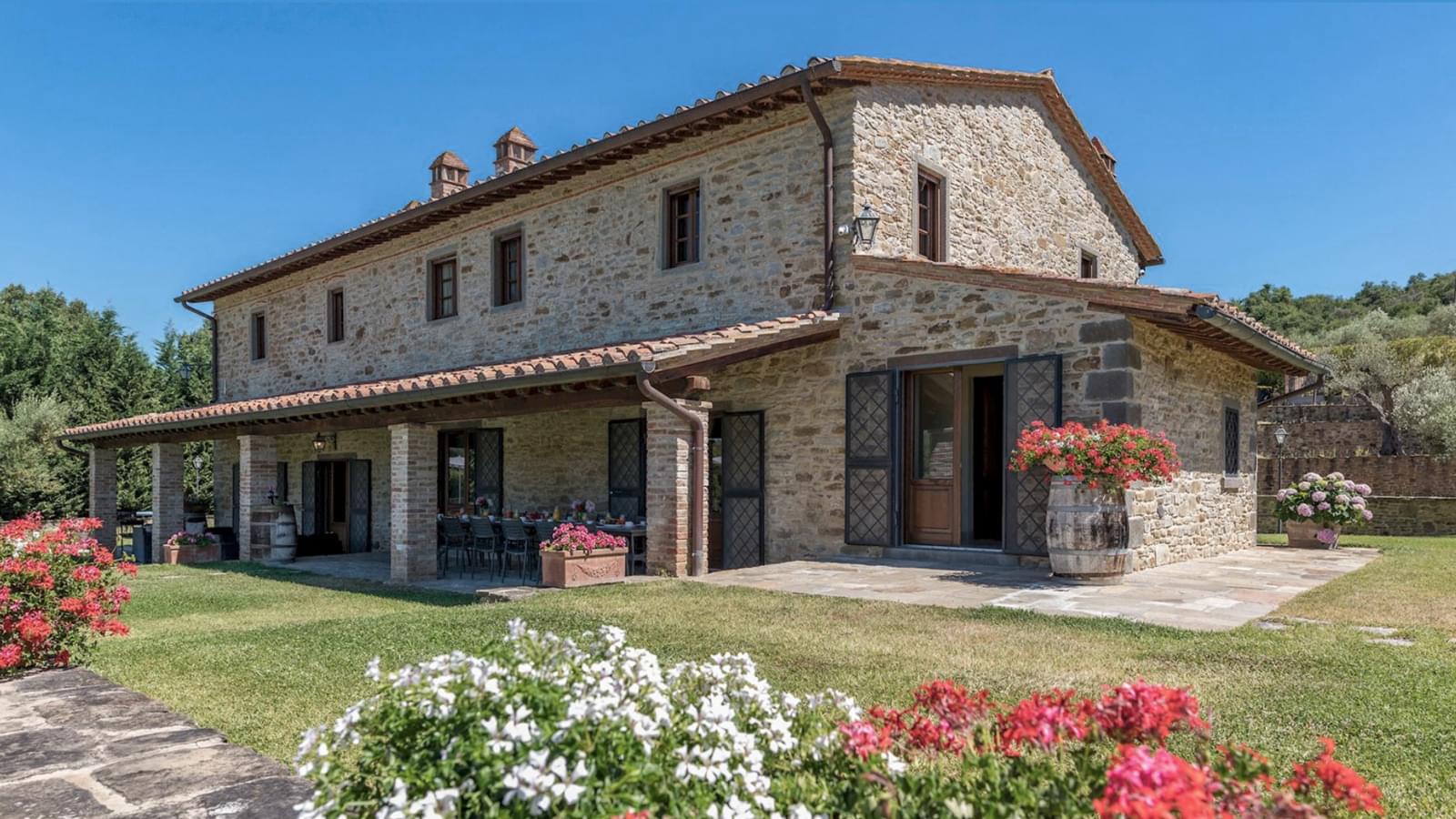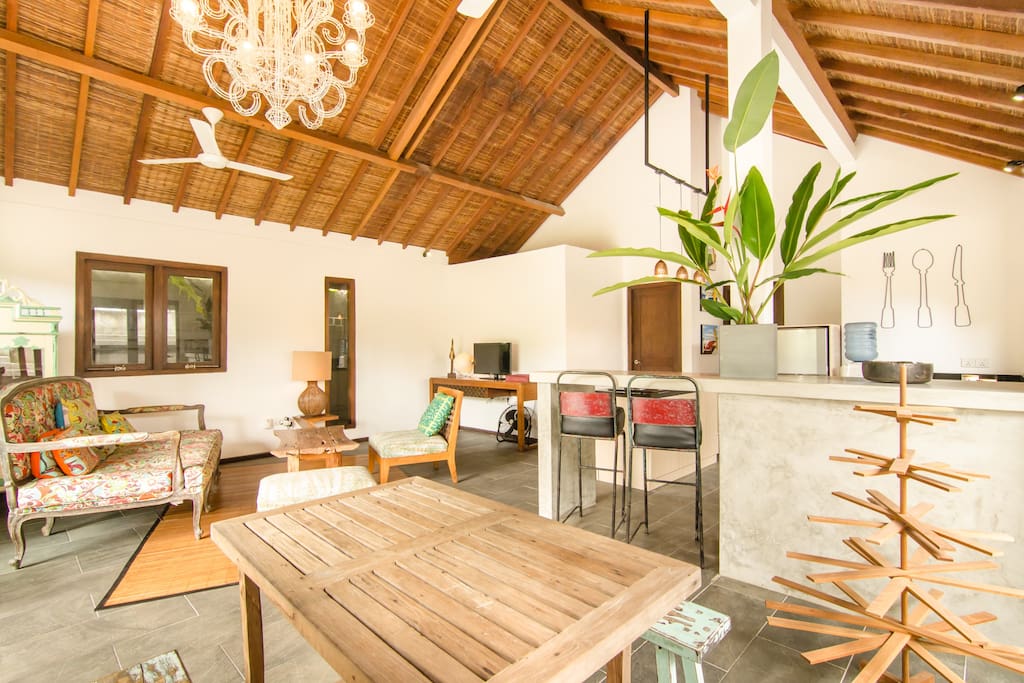Indonesia Vacation Rentals
Explore 1900+ rental homes and villas in Indonesia for your next vacation or business travel. With private vacation home rentals, enjoy a more personalized stay and a wide range of home amenities.
Types of vacation rentals in Indonesia
Available properties in Indonesia
Get to know Indonesia
Here are some things to know to support your visit:
Indonesia Overview
Indonesia, a breathtaking archipelago of over 17,000 islands, beckons with its stunning natural beauty and a mosaic of cultural experiences. Imagine waking up in your own private home, nestled among the lush landscapes or perched by the azure waters, with the luxury of a swimming pool to dip into whenever you please. Many of these homes offer not just privacy and comfort but also cater to pet owners, ensuring that your furry friends can join in on your tropical adventure.
The heart of Indonesia's allure is undoubtedly Bali, an island that captivates with its emerald rice terraces and the spiritual pulse of its temples. The iconic Tanah Lot stands on a rocky islet, offering sunsets that are nothing short of magical, while the forested sanctuary of Ubud immerses you in Bali's artistic soul. Renting a private villa here allows you to experience the island's enchantment away from the crowds, giving you a slice of paradise all to yourself.
Indonesia's natural wonders are a siren call to the adventurous. The Komodo National Park is a realm where the ancient Komodo dragons roam, and the surrounding seas are a diver's dream, teeming with life. The Coral Triangle, with its kaleidoscope of marine biodiversity, is a world-class snorkeling destination. Opting for a beachfront home rental here means the ocean is just steps away, your personal gateway to underwater marvels.
Java's volcanic landscapes beckon with their otherworldly beauty. The ethereal mist over Mount Bromo and the electric-blue flames of Ijen Crater are sights that command awe and respect. Sumatra's dense rainforests are a sanctuary for orangutans, and the Gili Islands' sandy shores and crystal-clear waters offer a serene escape, with private beach houses enhancing the experience of seclusion and tranquility.
Indonesia's cultural fabric is rich and varied, with each island weaving its own narrative. The intricate batik textiles, the mesmerizing wayang kulit shadow puppetry, and the vibrant flavors of local cuisine like satay and nasi goreng are a feast for the senses. In Jakarta, the nation's capital, the pulse of modernity beats strong, yet historical gems like Kota Tua remind us of the city's storied past.
The country's festivals are a riot of color and tradition, from the sacred ceremonies in Bali to the dramatic Pasola festival in Sumba. By choosing a private home as your base, you can immerse yourself in these local celebrations and then retreat to your personal haven, away from the hustle and bustle.
Indonesia is a land of contrasts, where the serene beauty of nature coexists with vibrant cultural expressions. It's a place where each day can be an adventure, each meal a discovery, and each stay a memory crafted in the comfort of your own private retreat. With its inviting beaches, enchanting attractions, and the promise of an exclusive experience in a home away from home, Indonesia is not just a destination; it's a personal journey waiting to unfold.
Cultural Attractions in Indonesia
Indonesia, an archipelago of over 17,000 islands, offers a cultural kaleidoscope for travelers with a passion for the arts, history, and local customs. Its diverse cultural heritage, shaped by indigenous traditions, Hindu-Buddhist influences, and colonial history, makes it a fascinating destination for cultural enthusiasts.
Begin your journey in the cultural heart of Bali, Ubud, where traditional Balinese dance performances such as the Kecak and Legong captivate audiences with their intricate movements and expressive gestures. Ubud is also home to numerous art galleries and museums, such as the Neka Art Museum and the Agung Rai Museum of Art (ARMA), showcasing both traditional and contemporary Balinese art.
In Yogyakarta, the cultural soul of Java, you can explore the ancient temples of Borobudur and Prambanan, both UNESCO World Heritage Sites. Borobudur, the world's largest Buddhist temple, offers a profound glimpse into Indonesia's spiritual history, while Prambanan's towering Hindu temples are adorned with detailed stone carvings depicting the Ramayana epic.
For a deep dive into Indonesia's colonial past, visit Kota Tua in Jakarta, the old town area featuring Dutch colonial buildings that now house museums such as the Jakarta History Museum. The National Museum of Indonesia also resides in Jakarta, offering an extensive collection of artifacts that span the archipelago's vast history.
Live music thrives across Indonesia, from the traditional gamelan orchestras to contemporary music scenes. In Bali, experience the hypnotic sounds of a gamelan performance, or in Jakarta, attend the Java Jazz Festival, one of the largest jazz festivals in the world.
Art enthusiasts will find a vibrant scene in Bandung, with its numerous art spaces and the annual Bandung Contemporary Art Awards. The city's creative atmosphere is also evident in its street art and local fashion boutiques.
Local customs are best experienced through Indonesia's myriad of festivals and ceremonies. Witness the elaborate funeral rites in Tana Toraja, Sulawesi, or join in the celebrations of Bali's Galungan festival, where the island comes alive with offerings, traditional attire, and processions.
Indonesia's culinary landscape is as diverse as its culture. Sample the rich flavors of Indonesian cuisine, from the spicy rendang of Padang to the sweet Javanese gudeg. Each region offers its own unique dishes, providing a delicious way to understand the local customs and traditions.
In Indonesia, every island tells its own story, every dance communicates a deeper meaning, and every artifact reveals a piece of the nation's soul. It's a destination that not only offers a feast for the senses but also an enriching journey through the tapestry of human expression.
Family friendly activities in Indonesia
Indonesia is a tropical paradise that offers a treasure trove of adventures for families traveling with children. From its vibrant culture to its stunning natural landscapes, there's something to captivate kids of every age.
Begin your family adventure in Bali, where the beaches are perfect for sandcastle building and the waters invite young swimmers and snorkelers. The Bali Safari and Marine Park is a hit with families, offering close encounters with exotic animals, fun shows, and an amusement park with rides suitable for young children.
For a cultural experience, take the kids to see a traditional Balinese dance performance. The colorful costumes, dramatic music, and storytelling through dance will enchant both kids and adults alike. In Ubud, the Monkey Forest is a must-visit, where children can observe playful monkeys in their natural habitat, but remind them to hold onto their belongings – the monkeys are known to be quite cheeky!
Venture to the island of Java to explore the magnificent Borobudur Temple. Although it might be a climb, the view from the top is worth it, and the journey is filled with fascinating carvings that can spark the imagination of young adventurers.
For something truly unique, head to Komodo National Park, where families can witness the legendary Komodo dragons in their natural environment. While the dragons are the main attraction, the park also offers beautiful pink sand beaches and opportunities for snorkeling in crystal-clear waters teeming with marine life.
In Jakarta, the capital city, Kidzania provides an educational and entertaining experience where children can role-play different professions in a kid-sized city. It's a fun way for them to learn about the working world while engaging in interactive activities.
For a break from the hustle and bustle, the Taman Mini Indonesia Indah is a cultural park that showcases traditional houses from across the Indonesian archipelago. Children can learn about the diverse cultures of Indonesia and enjoy various rides and museums within the park.
Lastly, don't miss the chance to visit the Gili Islands, where horse-drawn carriages are the main mode of transport. The absence of motorized vehicles makes it a peaceful retreat, and the shallow waters around the islands are perfect for young snorkelers to spot turtles and colorful fish.
Indonesia's blend of cultural experiences, wildlife encounters, and beautiful natural settings make it an ideal destination for families seeking an enriching and exciting holiday with children.
Outdoor activities in Indonesia
Indonesia, an archipelago of over 17,000 islands, is a treasure trove of natural wonders and outdoor activities that cater to every nature enthusiast's dream. From volcanic landscapes to tropical rainforests and pristine beaches, Indonesia's diverse ecosystems offer an unparalleled connection with nature.
Begin your adventure at the iconic island of Bali, where the lush terraced rice fields of Ubud provide a serene backdrop for hiking and cycling. The island's central highlands are home to the majestic Mount Batur, an active volcano where you can embark on a sunrise trek for spectacular panoramic views.
Dive enthusiasts will find paradise in the Coral Triangle, the global center of marine biodiversity. The waters around the Raja Ampat Islands are teeming with life, offering some of the best snorkeling and diving experiences in the world. Similarly, the Komodo National Park, home to the famous Komodo dragons, boasts vibrant underwater scenes alongside its rugged, hilly savannah.
For a truly off-the-beaten-path experience, venture to Sumatra's Gunung Leuser National Park, part of a UNESCO World Heritage site. Here, you can trek through the rainforest to spot orangutans, rhinos, and elephants in their natural habitat. The park's challenging trails lead to stunning waterfalls and hot springs, providing a rewarding experience for avid hikers.
Java, Indonesia's most populous island, is not to be overlooked. The awe-inspiring Mount Bromo, with its otherworldly landscapes, is a highlight for trekkers. Nearby, the Ijen Crater offers a unique night hike to witness the electric-blue flames of the crater's sulfuric gas.
For those seeking tranquility, the Gili Islands offer a serene escape with their car-free policy and idyllic beaches. Cycling around these small islands or enjoying yoga retreats are popular ways to unwind amidst nature.
Adventurous souls might also explore the lesser-known islands of Flores, with its tri-colored volcanic lakes at Mount Kelimutu, or Sumba, where traditional villages and untouched beaches await discovery.
Indonesia's natural wonders extend to its cultural heritage as well. The Borobudur Temple in Central Java, surrounded by lush forests and rice fields, is a mystical place to visit at dawn, as the mist rises around the ancient stupa-filled complex.
Whether you're climbing volcanoes, diving in rich coral reefs, or simply soaking in the natural hot springs, Indonesia's vast natural beauty and outdoor activities are bound to captivate and inspire all who visit.
Weather in Indonesia
Indonesia, a vast archipelago stretching across the equator, offers a tropical climate with two distinct seasons: the dry season and the rainy season. The country's weather is characterized by high humidity and warm temperatures throughout the year, with regional variations due to its diverse geography and topography.
The dry season, running from May to September, is the most popular time for travelers to visit Indonesia. During these months, the weather is generally sunny and dry, with lower humidity levels, making it ideal for outdoor activities and beach holidays. The average temperature ranges from 25°C to 30°C (77°F to 86°F), although it can be cooler in the highlands and mountainous regions. Bali and Java are particularly pleasant during this period, offering excellent conditions for exploring temples, hiking, and enjoying the beaches.
The rainy season, from October to April, sees higher humidity and frequent downpours, especially in the afternoon or evening. Despite the rain, temperatures remain warm, typically hovering between 25°C and 32°C (77°F to 90°F). While some travelers may shy away from this season, it can be a great time to visit for those who don't mind the occasional shower, as the landscapes are lush and the tourist sites are less crowded. The rainforests of Sumatra and Kalimantan (Borneo) are particularly vibrant during this time.
In regions like the Maluku Islands and Papua, the weather patterns can be less predictable, with rainfall possible year-round. However, these areas also experience periods of dry weather that can be suitable for travel.
For those seeking the most comfortable climate, the transition months between the seasons, such as April and October, can offer a good balance of less rain and moderate temperatures. These months can also provide the advantage of fewer tourists and better deals on accommodation and flights.
It's important to note that Indonesia's vast size means that weather conditions can vary significantly from one island to another. Therefore, it's advisable to check the specific climate of your destination within Indonesia to better plan your trip. Regardless of when you visit, Indonesia's warm temperatures and rich cultural and natural landscapes make it a year-round destination for travelers.
Transportation in Indonesia
Indonesia, an archipelago of over 17,000 islands, offers a diverse array of transportation options to accommodate travelers. International visitors typically arrive by air, with the main gateway being Soekarno-Hatta International Airport in Jakarta. Other major airports include Ngurah Rai International Airport in Bali and Juanda International Airport in Surabaya, which also handle a significant number of international flights.
For inter-island travel, domestic flights are the most efficient way to cover the vast distances between islands. Indonesia's national carrier, Garuda Indonesia, along with other local airlines like Lion Air and AirAsia, offer extensive networks connecting major cities and tourist destinations.
Sea travel is another important mode of transportation, with ferries and boats linking the islands. The state-run Pelni ships provide longer-haul ferry services between major ports, while speedboats and local ferries are commonly used for shorter crossings, especially in tourist areas like the Gili Islands and Nusa Penida.
Once on land, the options vary by island. In Java, the train network is a popular choice for traveling between major cities like Jakarta, Bandung, Yogyakarta, and Surabaya. The trains offer a scenic and comfortable way to see the countryside.
For local travel within cities and towns, buses and minibuses (known locally as "angkot") are widely used. In larger cities like Jakarta and Surabaya, TransJakarta and Suroboyo Bus rapid transit systems provide a more organized bus service. Taxis and ride-hailing apps like Gojek and Grab are also prevalent, offering convenient and affordable rides.
Motorbikes are a ubiquitous sight in Indonesia and are often the quickest way to navigate through traffic. Rentals are available in most tourist areas, and motorbike taxis (ojek) can be hailed for short trips.
As for walkability, it greatly depends on the destination. Cities like Yogyakarta and Ubud are relatively pedestrian-friendly with attractions, markets, and dining options within walking distance. However, in many parts of Indonesia, especially in busy cities like Jakarta, walking is less practical due to traffic, heat, and limited sidewalks.
In summary, Indonesia's transportation network is as varied as its geography. While air and sea travel are essential for hopping between islands, on land, a mix of trains, buses, taxis, and motorbikes provide comprehensive coverage. Walkability can be limited, so local transport is often necessary to fully explore the islands.









